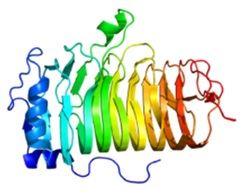In humans, the B lymphocyte antigen CD20, encoded by the MS4A1 gene, is an activated glycosylated phosphoprotein that is expressed on the surface of all B cells at the beginning of the pro-B phase, and the concentration gradually increases until maturity. The structure of MS4A1 is predicted to contain a short intracellular domain, four transmembrane segments (4TM) and a long cytoplasmic tail, involved in intracellular signaling. MS4A1 is present in B cell lymphoma, hairy cell leukemia, B cell chronic lymphocytic leukemia, and melanoma cancer stem cells. MS4A1 expression is regulated by chemokine signaling by the CXCR4/SDF1 axis, and this may be compromised by drugs that interfere with microenvironment interactions.
| Basic Information of MS4A1 | |
| Protein Name | Membrane protein MS4A1 |
| Gene Name | MS4A1 |
| Aliases | B-lymphocyte surface antigen B1, Bp35, Leukocyte surface antigen Leu-16, Membrane-spanning 4-domains subfamily A member 1, CD_antigen:CD20 |
| Organism | Homo sapiens (Human) |
| UniProt ID | P11836 |
| TransmMS4A1rane Times | 4 |
| Length (aa) | 297 |
| Sequence | MTTPRNSVNGTFPAEPMKGPIAMQSGPKPLFRRMSSLVGPTQSFFMRESKTLGAVQIMNGLFHIALGGLLMIPAGIYAPICVTVWYPLWGGIMYIISGSLLAATEKNSRKCLVKGKMIMNSLSLFAAISGMILSIMDILNIKISHFLKMESLNFIRAHTPYINIYNCEPANPSEKNSPSTQYCYSIQSLFLGILSVMLIFAFFQELVIAGIVENEWKRTCSRPKSNIVLLSAEEKKEQTIEIKEEVVGLTETSSQPKNEEDIEIIPIQEEEEEETETNFPEPPQDQESSPIENDSSP |
MS4A1 is present on cells of most B cell tumors and is absent in other similar emerging T cell tumors, and it plays a very important role in diagnosing conditions such as B cell lymphoma and leukemia. However, the presence or absence of MS4A1 in these tumors is not associated with prognosis, and the progression of the disease is roughly the same in either case. MS4A1 positive cells are also sometimes present in Hodgkin's disease, in cases of myeloma and thymoma. An MS4A1 signal for B-cell growth arrest is recognized early by the B1 mAb, whereas another MS4A1 mAb, IF5, induces proliferation of MS4A1-stimulated B cells. There are many peptide mimotopes that mimic the CD20 antigen, which is identified in the solution phase and bind to rituximab. Rituximab is a chimeric monoclonal antibody against the CD20 protein that disrupts B cells and treats lymphoma, leukemia, transplant rejection and autoimmune diseases.

This article shows that direct binding of rituximab to the CD20dim T cell population induces its consumption and may contribute to reduced T cell activation following rituximab treatment.
This study evaluates the nature of the CD20 component associated with T-MF, with a poor prognosis in the presence of >50% CD20 cells and the nodular hair follicle pattern of this component.
This article indicates that peptide mimotopes have potential benefits in sensor applications because peptide-peptide interactions in SAM can be controlled to affect the binding of target proteins by adding functional groups to the peptide.
This article reveals that Rituximab-vcMMAE is capable of inhibiting colony formation in CD20 positive cells, which may be a highly selective treatment for B cell lymphoma.
This article suggests that the clinical and/or prognostic significance of CD20-expressing neoplastic T cells is unclear.
Membrane protein studies have advanced significantly over the past few years. Based on our versatile Magic™ membrane protein production platform, we could offer a series of membrane protein preparation services for worldwide customers in reconstitution forms as well as multiple active formats. Aided by our versatile Magic™ anti-membrane protein antibody discovery platform, we also provide customized anti-MS4A1 antibody development services.
During the past years, Creative Biolabs has successfully generated many functional membrane proteins for our global customers. We are happy to accelerate the development of our clients’ programs with our one-stop, custom-oriented service. For more detailed information, please feel free to contact us.
All listed services and products are For Research Use Only. Do Not use in any diagnostic or therapeutic applications.